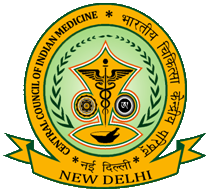Central Council of Indian Medicine
Central Council of Indian Medicine (CCIM) is a statutory body in India established under the Indian Medicine Central Council Act, 1970. The council is responsible for the standardization of higher education in Ayurveda, Siddha, Unani, and Sowa-Rigpa. It also oversees the recognition of medical qualifications, accreditation of medical institutions, and the maintenance of a central register for practitioners of traditional systems of medicine in India.
History[edit | edit source]
The Central Council of Indian Medicine was established in 1971 following the enactment of the Indian Medicine Central Council Act, 1970. The act was a part of the Indian government's efforts to organize and promote traditional systems of medicine in the country, which have a long history and deep cultural roots.
Functions[edit | edit source]
The primary functions of the CCIM include:
- Standardization of Ayurvedic, Siddha, Unani, and Sowa-Rigpa education across India.
- Recognition of medical qualifications in traditional medicine awarded by universities or institutions in India.
- Accreditation of institutions offering courses in traditional systems of medicine.
- Maintenance of a Central Register of Indian Medicine, and the enrollment of qualified practitioners.
- Advising the Government of India on matters relating to recognition (or de-recognition) of medical qualifications in traditional systems of medicine.
Education and Practice[edit | edit source]
The CCIM prescribes minimum standards of education in traditional medicine, which are required to be followed by institutions seeking to offer courses in Ayurveda, Siddha, Unani, and Sowa-Rigpa. It also sets guidelines for the practice of traditional medicine in India, ensuring that practitioners meet the necessary qualifications and adhere to ethical standards.
Controversies and Challenges[edit | edit source]
The CCIM has faced challenges and controversies, particularly regarding the integration of traditional systems of medicine with mainstream medical practice in India. Debates have centered around the scientific validation of traditional practices and the need for research and development to modernize these systems of medicine.
Recent Developments[edit | edit source]
In recent years, the CCIM has taken steps to modernize and promote traditional systems of medicine, including the introduction of new regulations and curricula that incorporate modern scientific knowledge and research methodologies. These efforts aim to enhance the global acceptance and credibility of traditional Indian medicine.
See Also[edit | edit source]
- Ayurveda
- Siddha Medicine
- Unani Medicine
- Sowa-Rigpa
- Ministry of AYUSH
- National Commission for Indian System of Medicine
Search WikiMD
Ad.Tired of being Overweight? Try W8MD's physician weight loss program.
Semaglutide (Ozempic / Wegovy and Tirzepatide (Mounjaro / Zepbound) available.
Advertise on WikiMD
|
WikiMD's Wellness Encyclopedia |
| Let Food Be Thy Medicine Medicine Thy Food - Hippocrates |
Translate this page: - East Asian
中文,
日本,
한국어,
South Asian
हिन्दी,
தமிழ்,
తెలుగు,
Urdu,
ಕನ್ನಡ,
Southeast Asian
Indonesian,
Vietnamese,
Thai,
မြန်မာဘာသာ,
বাংলা
European
español,
Deutsch,
français,
Greek,
português do Brasil,
polski,
română,
русский,
Nederlands,
norsk,
svenska,
suomi,
Italian
Middle Eastern & African
عربى,
Turkish,
Persian,
Hebrew,
Afrikaans,
isiZulu,
Kiswahili,
Other
Bulgarian,
Hungarian,
Czech,
Swedish,
മലയാളം,
मराठी,
ਪੰਜਾਬੀ,
ગુજરાતી,
Portuguese,
Ukrainian
WikiMD is not a substitute for professional medical advice. See full disclaimer.
Credits:Most images are courtesy of Wikimedia commons, and templates Wikipedia, licensed under CC BY SA or similar.
Contributors: Prab R. Tumpati, MD

